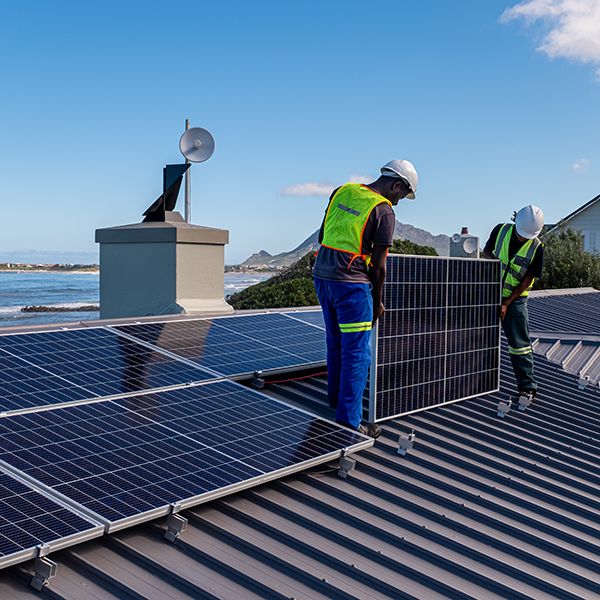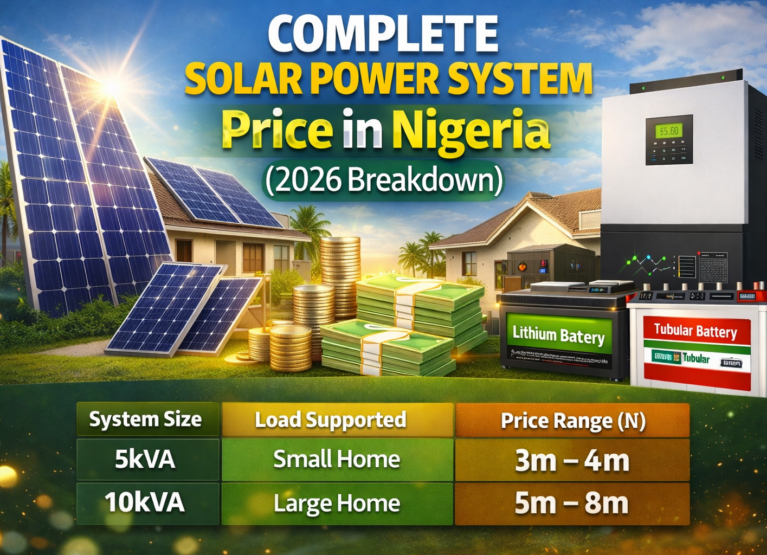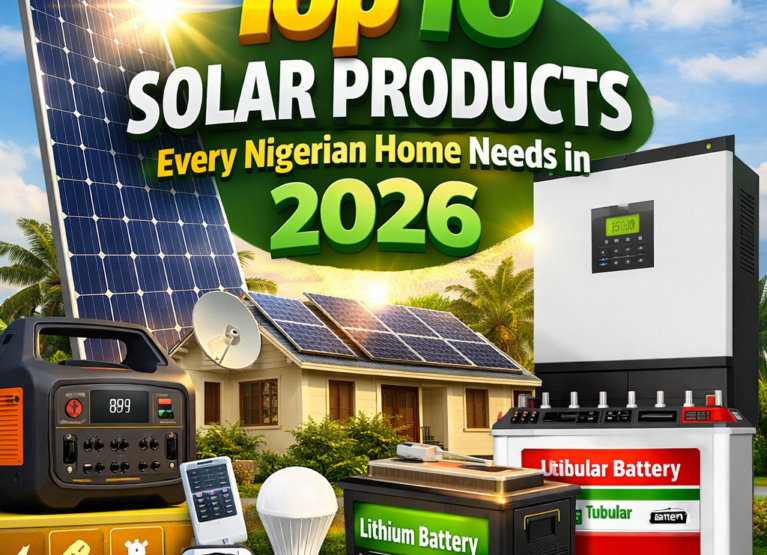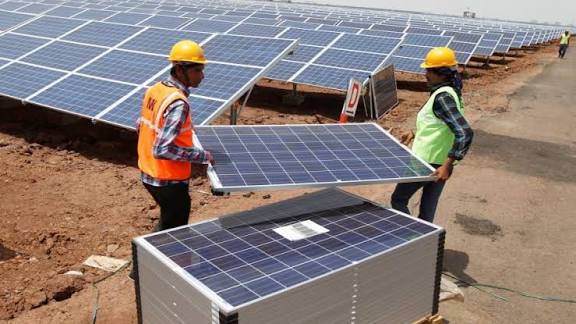Best Solar System for Home in Nigeria (2025 Buyer’s Guide)
Accessing reliable electricity in Nigeria remains a significant challenge. Sometimes you come back home after a long day, and there’s no light. Or maybe NEPA just restored power, and it goes off again immediately. You try to turn on your generator, and it either has a fault or you realize there’s no fuel.
These kinds of moments can be very frustrating, especially when you have important things to do, such as charging your phone, watching a football match, or simply enjoying some peace after a busy day.
That’s why a lot of Nigerians are now thinking about solar power. It’s clean, silent, doesn’t need fuel, and once installed, it keeps giving you light every day as long as the sun shines.
In this post, we’ll talk about everything you need to know when planning to get the best solar system for your home in Nigeria in 2025.
What is a Solar System?
A solar system is a setup that uses energy from the sun to produce electricity. That electricity can be used to power your lights, fans, TV, fridge, and other appliances. It works by collecting sunlight using something called solar panels, storing the power inside a battery, and then using an inverter to convert it into the type of electricity your house needs.
In short, sunlight enters the panels, the energy is stored, and the power is used when needed.
Why More Nigerians Are Now Choosing Solar in 2025
In 2025, electricity problems in Nigeria have gotten even worse in some places. More homes are spending thousands of naira every month on fuel alone, especially those using generators daily. Also, there are areas where people don’t get power for days or even weeks. Some people now live completely without public electricity and survive only through generators and solar systems.
Because of this, people now see solar as a better option. You don’t need to buy fuel every day. Once it’s installed, you can sleep well knowing your fan and fridge will work all night.
What Makes Up a Home Solar System
To understand solar, you must know the main parts that make it work. Let’s go over them one by one.
1. Solar Panels
These are the flat things you put on your roof. They collect energy from the sun. The more panels you have, the more power you get. There are different types, but the most common are called monocrystalline panels. They work well in hot weather and don’t need too much space.
2. Inverter
This is the brain of the system. It changes the power from the panels into the kind of power your TV, fan, or fridge can use. Some inverters can also work with both NEPA and battery, and they are called hybrid inverters. Make sure your inverter can work with your battery and your load.
3. Batteries
Batteries store the power from the sun so you can use it at night or when it’s cloudy. There are two main types: lithium-ion and gel batteries. Lithium-ion lasts longer and charges faster, but it costs more. Gel batteries are cheaper but heavier and don’t last as long.
4. Charge Controller
This device controls how the battery is charged. It helps to protect the battery so it doesn’t get damaged from too much or too little power.
5. Cables and Mounting Equipment
You also need cables to connect everything. And the panels need to be mounted properly on the roof. If not done well, wind or rain can damage them.
If you remove one of these parts, the whole thing won’t work properly. So it’s important to know each one and understand how they work together to give you reliable electricity.
How to Know the Right Size of Solar System for Your Home
Not every house needs the same solar system. A single person living in a self-contained room will not need the same system as a family of five in a three-bedroom flat. That’s why, before buying any solar setup, you need to know how much electricity you use every day.
You can do this by writing down the appliances you use and how many hours you use them. For example, if you use one fan for 10 hours and the fan uses 75 watts, that’s 750 watts in one day. Do the same for your bulbs, TV, fridge, and other appliances. Add everything together, and you’ll have a rough idea of how much energy you need daily.
This helps you decide the number of panels and size of batteries to buy. If you don’t do this and you guess, you may end up buying a solar system that’s too small and won’t meet your needs.
Types of Batteries Used in Solar Systems
One of the most important parts of your solar setup is the battery. This is where the energy is stored. There are different types of batteries, but the most common ones in Nigeria are lead-acid and lithium batteries.
Lead-acid batteries
The Lead-acid batteries are cheaper. They’ve been in the market for many years and can still work well. But they are heavy, take up more space, and may not last very long. If you don’t manage them well, they can spoil quickly.
Lithium batteries
These are more expensive, but they last longer and charge faster. They don’t take up much space, and many people now prefer them because of how strong and reliable they are. If you have the budget, it’s better to go for lithium batteries.
Understanding Solar Panels and the Ones That Work Best in Nigeria
Solar panels are the ones that catch sunlight and change it into energy. If your solar panel is not strong or is made with poor material, you won’t get good energy no matter how bright the sun is.
In Nigeria, we have enough sun all year round. But not all panels make good use of it. That’s why you need high-quality panels that can last for many years. Some of the popular ones people use are Canadian Solar, Trina Solar, Jinko Solar, and LONGi. They perform well, even in very hot weather.
It’s better to go for trusted brands than to buy cheap ones that will stop working after a few months.
Best Inverters for Home Use
The inverter is the brain of your solar system. It converts the power from the battery into something your fan, TV, and fridge can use. If your inverter is bad, your system won’t give you steady light.
Inverters come in different sizes. For small homes, you may only need 1kVA or 2kVA. For medium to large homes, you may need 3kVA to 5kVA or more. Always buy a pure sine wave inverter because it works better with most appliances.
Brands like Luminous, Sukam, Felicity, and Mercury are well-known in Nigeria. They’ve been around for many years and are trusted by many homes.
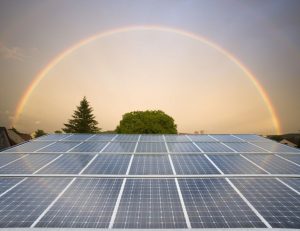
Best Solar System for Home in Nigeria
How Much Does a Solar System Cost in Nigeria in 2025?
The price of a solar system depends on what you want it to power. If you only want to run a few bulbs, a fan, and charge your phone, you can spend between 150,000 to 300,000 naira. But if you want to power your entire house, including fridge, freezer, and maybe an air conditioner, you may need to spend up to 2 million naira or more.
Here’s a simple example. A basic 1kVA system that can carry a fan, bulbs, TV, and decoder can cost between 300,000 to 450,000 naira. A 2kVA system that can also carry a fridge may cost up to 800,000 naira. A 5kVA system for full home use may go from 2 million to 4 million naira, depending on the battery type and panel size.
But remember, this is a one-time investment. After paying, you won’t need to spend anything again except for small maintenance. Unlike generators, no fuel, no oil, no noise.
Why You Should Avoid Very Cheap Solar Systems
There are many cheap solar panels and batteries on the market. Some look attractive because they cost less. But most of them don’t last. You may save money today, but you will spend more tomorrow.
Many people who bought very cheap panels later found that they couldn’t even power one fan. Others had batteries that got bad after just six months. So when buying solar, always focus on quality and durability. Ask around, read reviews, and speak to trusted installers.
Maintenance Tips for Your Solar System
Solar systems don’t need too much maintenance, but there are still things you should do to keep it working well.
• Clean your solar panels every 6 months. Dust can block the sun.
• Don’t let water enter the inverter or battery box.
• Check the cables once in a while for cuts or damage.
• If you hear strange sounds or see blinking lights on the inverter, call the installer.
• If you use a lithium battery, avoid deep discharge often.
If you notice strange sounds or error messages, don’t ignore them. Call your installer immediately so they can help you fix the problem before it gets worse.
Is Solar Really Worth It?
Many people ask if it’s worth spending millions on a solar system. The answer is yes. Let’s say you spend 3 million naira on a solar setup today. If you normally spend 50,000 naira every month on fuel and generator repairs, that’s 600,000 naira in one year.
In just 5 years, you would have spent 3 million on a generator and fuel. But your solar will still be working quietly and giving you power every day without any running costs. So in the long run, you save money and avoid stress.
Besides, solar helps the environment too. You reduce smoke, noise, and pollution.
Can You Power Air Conditioners with Solar?
Yes, you can power an AC with solar, but you will need a very strong system. Air conditioners use a lot of electricity. If you want to power an AC, a freezer, a pumping machine, and other heavy appliances, you must buy a bigger inverter, more batteries, and more solar panels.
Also, the kind of AC matters. Inverter ACs are better for solar because they use less power. So if you’re planning to run AC on solar, go for energy-saving models and talk to an expert before buying your system.
What to Do Before Buying Solar
Before buying, take time to understand your daily energy usage. List out everything you use and how long you use them daily. Speak to two or three solar installers and compare their advice and prices.
Don’t rush. Ask them questions. Check if they are using original products. A good installer will explain everything to you and help you choose the best option based on your budget.
Also, ask if they offer a warranty and after-sales service. It’s very important to know who to call if something goes wrong after installation.
Can You Install Solar Yourself?
It is possible, but not advisable. Unless you have proper knowledge, it’s better to call someone who has done it many times. Solar systems involve electricity, and if one connection is wrong, it can spoil the whole setup or even cause a fire.
A professional will know the right cable size, the best way to position the panels, and how to program your inverter correctly.
What Is Pay-as-you-go Solar?
Some companies now offer solar systems where you pay small-small, just like a loan. They install the system in your house, and you pay monthly like you would pay for fuel.
This is good for people who want solar but don’t have the full money up front. Some of these companies even give you an app or code to recharge your system monthly. But always read their terms and conditions well so you understand what you’re signing up for.
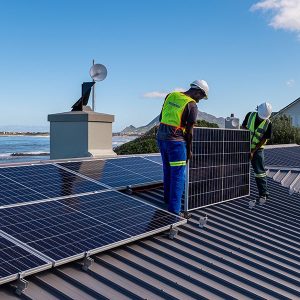
Best Solar System for Home in Nigeria
Conclusion
If you’re tired of spending money on fuel or you just want peace of mind, solar is a very good choice. In 2025, there are more options than ever, and the technology has improved a lot. From basic setups to full home systems, there’s a solar solution for every Nigerian home.
Just make sure you buy quality products, work with trusted installers, and choose what fits your home and your pocket. Once you set it up well, you can relax and enjoy light all year round, without thinking of NEPA or buying fuel again.
 English
English
 French
French
 German
German
 Italian
Italian

